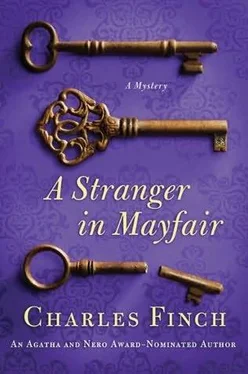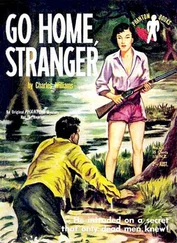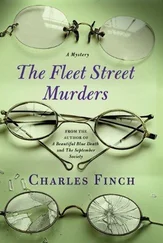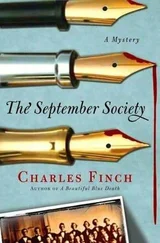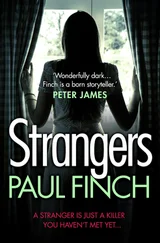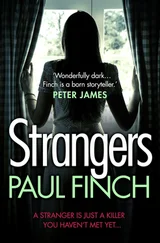Charles Finch - A Stranger in Mayfair
Здесь есть возможность читать онлайн «Charles Finch - A Stranger in Mayfair» весь текст электронной книги совершенно бесплатно (целиком полную версию без сокращений). В некоторых случаях можно слушать аудио, скачать через торрент в формате fb2 и присутствует краткое содержание. Жанр: Исторический детектив, на английском языке. Описание произведения, (предисловие) а так же отзывы посетителей доступны на портале библиотеки ЛибКат.
- Название:A Stranger in Mayfair
- Автор:
- Жанр:
- Год:неизвестен
- ISBN:нет данных
- Рейтинг книги:3 / 5. Голосов: 1
-
Избранное:Добавить в избранное
- Отзывы:
-
Ваша оценка:
- 60
- 1
- 2
- 3
- 4
- 5
A Stranger in Mayfair: краткое содержание, описание и аннотация
Предлагаем к чтению аннотацию, описание, краткое содержание или предисловие (зависит от того, что написал сам автор книги «A Stranger in Mayfair»). Если вы не нашли необходимую информацию о книге — напишите в комментариях, мы постараемся отыскать её.
A Stranger in Mayfair — читать онлайн бесплатно полную книгу (весь текст) целиком
Ниже представлен текст книги, разбитый по страницам. Система сохранения места последней прочитанной страницы, позволяет с удобством читать онлайн бесплатно книгу «A Stranger in Mayfair», без необходимости каждый раз заново искать на чём Вы остановились. Поставьте закладку, и сможете в любой момент перейти на страницу, на которой закончили чтение.
Интервал:
Закладка:
“And you-you let Collingwood believe Paul was a murderer? Your son?”
“Why do you think I’m crying, you halfwit?” she said. “Because of Paul. I don’t care whether Freddie Clarke burns in hell. Or his father, for that matter.”
“But I helped you!” said Ludo, shocked again. “You-you told me we had to protect ourselves! Our family!”
“I’m not going to say another word,” Elizabeth answered.
In its dimensions it was more like a Greek tragedy than anything he had ever come across in his career: the striving bastard (who turned out not to be a bastard at all), educating himself, seeking the approval of a diffident father; the mad wife; the incidental victims; the double-crossing and lies. Dallington was glassy-eyed. There was none of the satisfaction that usually comes at the end of a case.
In due course the doctor arrived, and so the wheels of bureaucracy began their slow revolutions. He gave her a sedative; she was docile enough but, true to her promise, didn’t speak. After him the police came, and then more police-the inspector, Rudd, was extremely troubled, needless to say-and soon she was taken away.
Rudd stayed behind, a bluff, genial, stupid man with a great red nose, the sort who would be the most popular man at his local public house. He was one of the two or three men who had risen after the death of Inspector Exeter.
“What do you reckon, Mr. Lenox?” he said. “Can she really have done it?”
“She admitted as much.”
He shook his head as if he didn’t like that much. “And attacked you! Lady Macbeth ain’t in it!”
“She ain’t,” agreed Dallington, still awestruck. Then a thought occurred to him. “I daresay Collingwood will be relieved.”
“Mightily,” said Lenox.
“Ah, you’ve put your finger on the thing, young man-is he innocent? Was he not complicit? What about the green butcher’s apron?”
Both Dallington and Lenox turned uneasy eyes on Ludo, who was sitting in the corner alone, a devastated man; everything in his mien said he hadn’t realized the extent of his wife’s evil.
“He certainly wasn’t involved,” said Lenox, “unless he agreed to go to Newgate to protect the Starlings.”
There was a tremendous commotion at the door just then, and two constables with their hands full of a fifty-year-old woman staggered back into the room.
“Where is she! I’ll kill her!” cried Frederick’s mother. “Where is that devil woman?” Her wild gaze alighted on Ludo. “Oh, Luddy!” she cried and in two or three steps fell on him.
To Lenox’s surprise he returned the embrace, and tears seemed to escape his eyes, too. “I’m so sorry,” Ludo said, patting her on the back. “Our poor son. He was such a lovely boy.”
In that instant Lenox wondered whether Ludo had loved her all along.
Chapter Forty-Eight
The next day Lenox resumed his place in the House of Commons. He was determined to make a go of it; the brief spark of excitement that the cholera problem had given him was fresh in his mind still, and he realized that to last in Parliament you had to be one of two sorts of people. You could be the dogged, workaday type (there had been plenty of Prime Ministers and Chancellors of the Exchequer who belonged to this category, and it was by no means lesser), and spend long hours in study and work. Or you could be the sort who felt strongly the inciting passion of ideas, and work to bend other men to your will.
He had no chance of being the first kind. It wasn’t in his makeup. But he could be the second kind, he hoped.
In the meanwhile it was Graham who filled the first role. As the days passed after the case had concluded and Lenox spent more and more time in his office, he found out that Graham had inexhaustible reserves of energy to devote even to the minutest issues. He was a wonderful taskmaster to Frabbs, both cajoling him into better work and teaching him how the work was to be done.
Lenox ran into Percy Field one morning in the halls of Parliament, and Field stopped him to say thank you again for the invitation to Lady Jane’s Tuesday.
“You’re all over the papers,” he said after they had exchanged “thank you” and “you’re welcome.” “Elizabeth Starling?”
“Poor Ludo-I wonder whether he’ll return to the House, or if he’s finished.”
“He’s back at Starling Hall, isn’t he?”
“Yes.”
He was there with Frederick Clarke’s mother. Before he had left he had come to Hampden Lane, some three days after his wife’s arrest, to apologize for the past weeks. As they sat in front of the fireplace, lit because the first frost of the autumn had been in the gardens and parks of the city that morning, Lenox studied the other man. His face was pained and older than before. He had taken the glass of claret Lenox offered but, in a way that was very unlike himself, didn’t touch it.
“Do you ever feel you’ve wasted your life?” he asked, an exceedingly, even inappropriately intimate question, but of course Lenox was prepared to make allowances for him.
“I daresay everyone feels that way once in a while.”
Ludo smiled. “No-I see you don’t know what I mean.”
“Perhaps not.”
“I’m taking Alfred to Starling Hall. Paul is there.”
“How are they?”
“Alfred is bewildered-between you and me, he’s rather a bewildered kind of soul-and Paul is angry. I think it will do them both good to get to Cambridge. They go next week.”
“Have you seen Elizabeth?”
“No,” he said shortly, “but Collingwood was in the house this morning. I poured my heart out to him.” He laughed. “I don’t think he forgave me. I wouldn’t either.”
“I can’t imagine he would, no.”
“There are no criminal charges to be laid against me.” Ludo paused. “Tell me, will you turn Fowler in?”
“He and I have our own agreement.”
“I wonder whether you would forgive me, Lenox.”
“Certainly.”
“Don’t be hasty. She might have killed you, you know, on the street outside of our house. D’you know, I feel now as if it was all a dream-a bizarre dream.”
“She was a strong-willed woman.”
“That’s like saying London is a biggish village,” responded Ludo, with a flash of his old bantering ways.
“Could I ask you a question, Ludo? Was Derbyshire supposed to vouch for you? Is that why you didn’t sign in?”
Ludo sighed. “Yes,” he said. “That’s right. If I had signed in, when I arrived it would have showed I wasn’t at the club during the time Freddie was murdered. I was home, in fact.”
Lenox nodded. “I woke up in the middle of the night and thought of it. After Elizabeth murdered Freddie, you went to the club to create an alibi for yourself. You must have tried to make people think you had already been there for many hours.”
“Yes. I lost money to Derbyshire so he would remember I was there, and said as often as I could that I had been there most of the day. I hoped they all would misremember how long I had been there, and in the end I said to Derbyshire point-blank: ‘Do you know how long I’ve been here? Ten hours. Time slips away, doesn’t it?’ It didn’t do me any good, apparently.”
There was a long pause. Both men’s eyes turned away from each other, Ludo’s to the fire, Lenox’s outside to the street, where men with upturned collars trotted by, trying to get indoors as fast as possible.
“Could I ask you another question?” asked Lenox at length.
“Oh? What’s that?” asked Ludo, startled from a reverie. “Of course.”
“The title-was that only important to Elizabeth? That Alfred should inherit? Or that there should be a title at all?”
“You’re a mind reader, I sometimes think. It was the subject that was just in my head.” He settled back in his chair, a pensive look on his face. “You’ve heard of old Cheshire Starling, I assume?”
Читать дальшеИнтервал:
Закладка:
Похожие книги на «A Stranger in Mayfair»
Представляем Вашему вниманию похожие книги на «A Stranger in Mayfair» списком для выбора. Мы отобрали схожую по названию и смыслу литературу в надежде предоставить читателям больше вариантов отыскать новые, интересные, ещё непрочитанные произведения.
Обсуждение, отзывы о книге «A Stranger in Mayfair» и просто собственные мнения читателей. Оставьте ваши комментарии, напишите, что Вы думаете о произведении, его смысле или главных героях. Укажите что конкретно понравилось, а что нет, и почему Вы так считаете.
